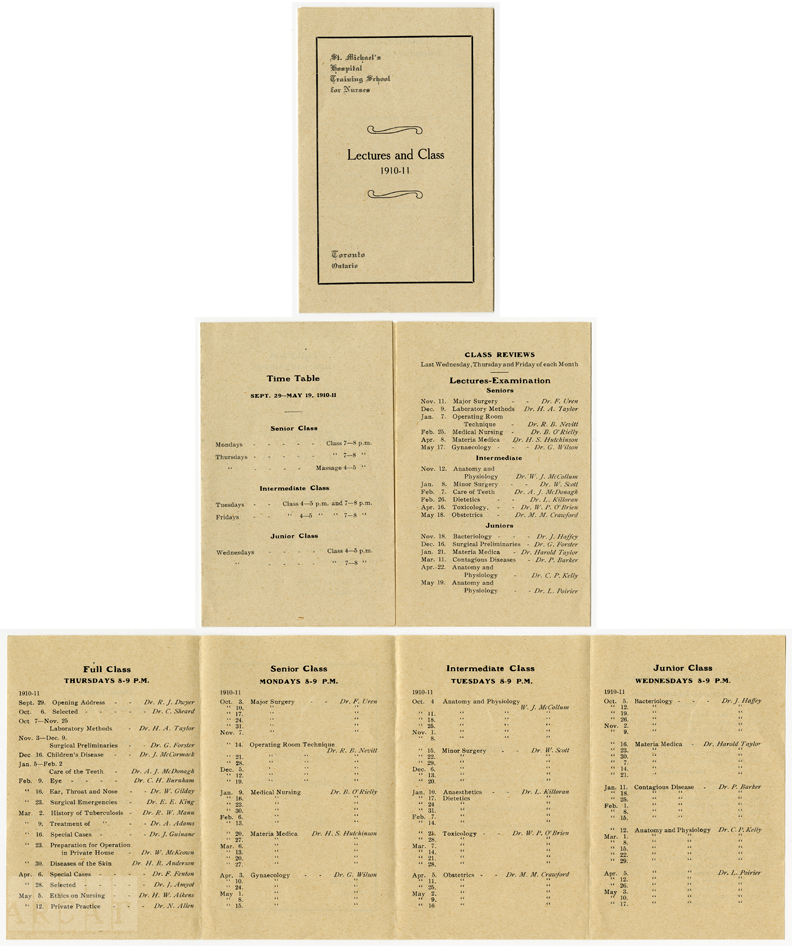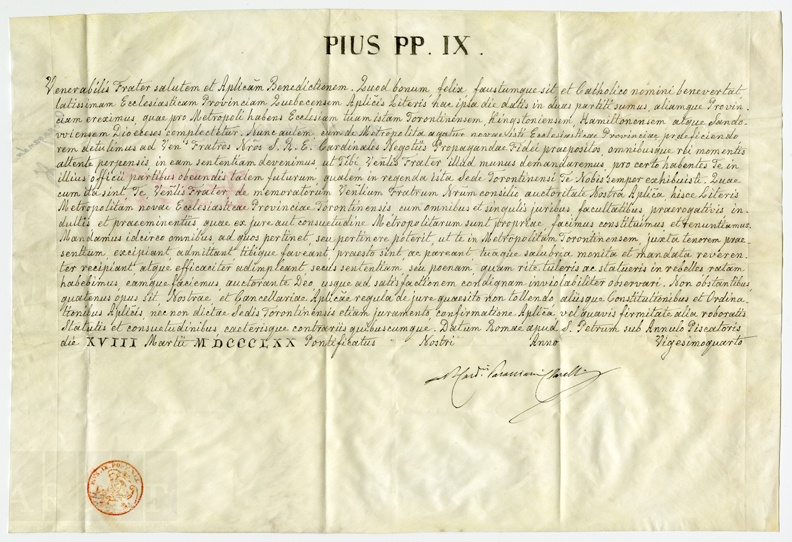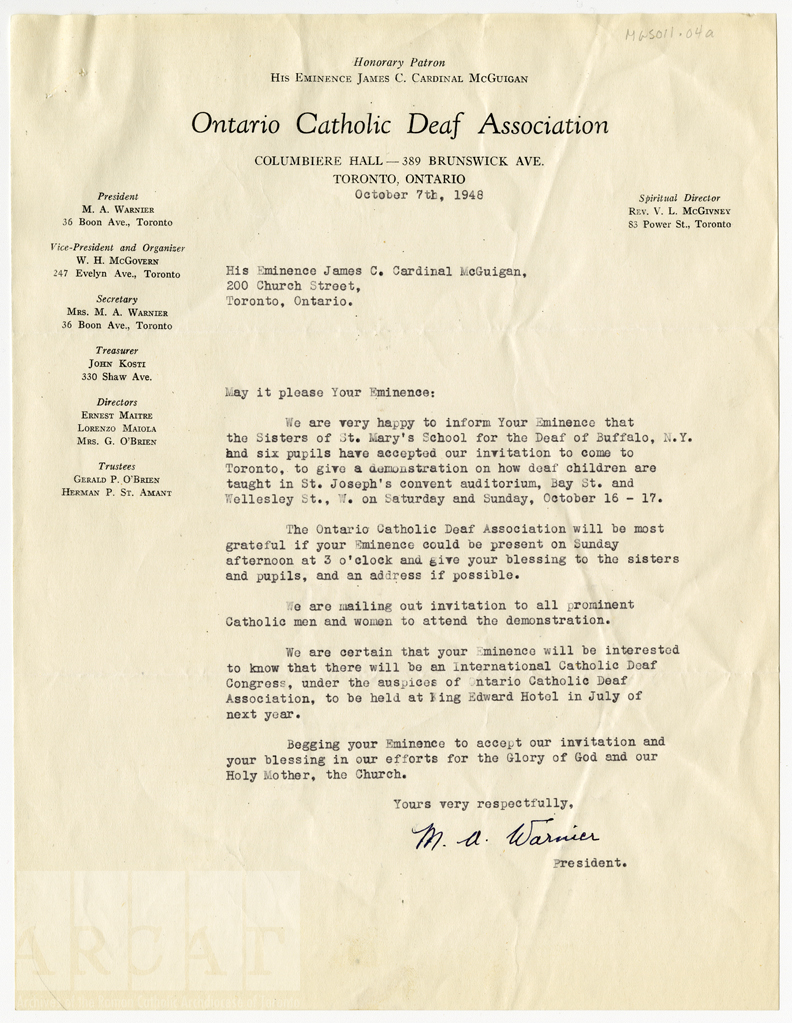This week's blog highlights a group of strong, caring, and dedicated women: nurses. We at the Archives have struggled, unfortunately, to find stories about women in our collection, since the large majority of our records are about cardinals, archbishops, and priests. Of course, these men had their own sisters, mothers, aunts, cousins, and friends, some of whom became nurses, and we would be remiss if we did not mention the religious sisters who have also been instrumental in the field. We are happy to feature a number of records about the different organizations and people involved in this time-honoured and noble profession.
Jean A. Mitchell, Director of Special Registration District 5 of the Registered Nurses' Association of Ontario, wrote to then-Archbishop McGuigan asking his permission to send a letter to clergy in the district requesting that all graduate nurses register with the Provincial Civilian Defense Committee in case their services are needed in an emergency:
 |
Letter from Jean A. Mitchell to Abp. McGuigan, March 31, 1942
and the form letter from Jean A. Mitchell requesting all graduate nurses to register, March 26, 1942
SW GC01.74a-b
Second World War fonds |
McGuigan was pleased to help Miss Mitchell and provided her with a directory that included contact information for clergy in all districts. One reason McGuigan may have been so accommodating is due to personal experience. In his introduction of Cardinal McGuigan at the 1946 Congress of the Catholic Canadian Nurses Association, Rev. Louis-Emile Hudon, Moral Director of Nurses at Quebec, mentioned one Alice McGuigan, sister to the Cardinal, who was a lieutenant/nursing sister in the Canadian Army Medical Corps:
 |
"Three months ago, just on March 27th, two women, ... the first one was Reverend Mother St. George, dean of Studies at St. Louis College, Montreal and the other one was Lieutenant Alice McGuigan of the Canadian Army Medical Corps, were at St. Michael's Cathedral in the joy to see, for the first time, their brother so loved, the Cardinal James Charles McGuigan. ...
Yes, dear Sisters, dear Nurses, one sister of Our Cardinal in Toronto is a member of the large family of all Catholic Nurses of Canada and we are very glad to receive this evening your Eminence in our Congress, because in your life and in your own family the problems of the Nurses were well known."
June 30, 1946
OC30 HF01
Other Collections - Catholic Nurses' Association of Canada - General Correspondence (1946-1963) |
The Sisters of St. Joseph founded St. Michael's Hospital in 1892. Until 1974, when nursing programs began to be offered at community colleges, students were trained at the hospital's Training School for Nurses. Students attended classes and lectures regularly:
 |
Lectures and class schedule, 1910-11
St. Michael's Hospital Training School for Nurses
Religious Orders Series, Sisters of St. Joseph |
The first graduating class, which was in 1894 after two years of study, consisted of seven students. The number of graduates increased yearly. In 1929, 53 students were honoured at the graduation ceremony:
 |
Invitation to the School of Nursing graduation exercises,
June 5, 1929
Religious Orders Series, Sisters of St. Joseph |
The St. Elizabeth Visiting Nurses' Association (now called Saint Elizabeth) was founded in 1908. Nurses would, as the name indicates, visit patients at their homes in Toronto. A record was kept of the number of new patients, the number of visits made, the number of non-Catholic patients and visits, the number of calls during the day or night, the types of cases (obstetrical, medical, surgical, operations, chronic), and the number of babies born:
 |
Record of the work of the St. Elizabeth Visiting Nurses for the year 1920
MN AE26.10
Archbishop McNeil fonds |
Margaret C. Macdonald was a Canadian nurse who, during her thirty-year career, served in the Spanish-American War, the Second Boer War, and World War I. When war was declared in 1914, Macdonald was appointed Matron-in-Chief of the Canadian Army Medical Corps (CAMC) and became the first woman promoted to the rank of Major in the British Empire. On June 12, 1920, Macdonald was the guest of honour at a Catholic Women's League luncheon in Toronto. She expressed her delight and fear to Archbishop McNeil about the invitation:
 |
Ottawa 19th May 1920
My dear Archbishop, your very kind note has filled me with pleasure and a wholesome degree of fear as well. I am much flattered at the suggestion of being the guest of honour at so large a gathering, especially one purely Catholic in character. Saturday, June 12th would best suit me. I shall do my very best to meet your wishes in the matter of an outline of our work overseas etc. If the Secretary of the C.W.L. will send me a formal invitation, I shall have no difficulty in obtaining the necessary permission to attend. The military authorities are strict on that point.
I am sure you will be interested to learn that St. F.X. has recognized the work of the army nursing service by conferring upon me the honorary degree of L.L.D. I went down for the commencement exercises -- had the pleasure of again meeting Rev. Mother St. Martin who is, with nuns and pupils, one of the most popular of superiors.
Looking forward to seeing you in June and with many thanks. I realize I am indebted to you for the privilege of this luncheon.
Believe me your Grace,
very faithfully,
Margaret C. Macdonald
P.T.O.
My correct designation is as follows
Miss M.C. Macdonald R.R.C. L.L.D.
Matron-in-Chief C.A.M.C.
It is not considered proper to use the title of Major as my rank is only relative. M.C.M.
MN AH09.55
Archbishop McNeil fonds
|
The Archives is fortunate to have a copy of Macdonald's speech, "Echoes of the Great War," from the luncheon, including hand-written corrections. This is the first page, where she began to describe her experience with nurses during World War I:
 |
To one whose work had long been almost entirely for and with men, the prospect of going to a war in charge of a party of one hundred odd women promised to be more alarming than novel -- so alarming, in fact, that my first step was one of protest. I declared by incompetency to assume responsibility for, what then seemed, so enormous a number of nurses. Instead of assurance or sympathy I was reminded of a soldier's first duty -- obedience. Denied a crumb of comfort, I took up my new duties with the same degree of liking one has for a cold plunge. However, long before the hundred odd had developed into a Corps of twenty-five hundred odd, confidence had succeeded fear, and novelty was swallowed up by a positive greed.
The more I knew of nurses the more of them I wanted to know. To gather all into the ranks of the elect of war became my hobby. An organization that expands gradually is easy of control. One grows along with it and finds that one thousand are quite as readily administered as on hundred; two thousand as two hundred and so on. In the Army, and for the reason that everything -- almost one's mind -- is governed by rule, difficulties of administration are perhaps not so frequently encountered. Still, with all the regulations in the world, there are bound to arise circumstances to which no rule applies. A law must be created to suit the occasion. Then comes in that indispensable quality possessed by nine-tenths of our Canadian women -- initiative.
FW GC01.108
First World War fonds |
It is perhaps unnecessary to state that nurses' work is very serious, sometimes meaning the difference between life and death. From time to time, however, they have had to deal with certain policies that some may find odd. But rules are rules! Dr. O'Reilly at the Toronto General Hospital made this very clear to Archbishop Lynch:
 |
Dr. O'Reilly regrets that some visitors have again violated the rules regarding singing &c in the Wards & begs to state that orders have been given to all nurses to strictly enforce all regulations relating to visitors & readers. Dr. O'Reilly thanks His Grace for the friendly letter & wishes Him all the compliments of the season, & feels sure that the present year will be free from all annoyances, which some mis-guided people have caused in the past in the Wards of the Hospital.
T. G. H. Jany 2/86
L AE04.28
Archbishop Lynch fonds |
Thank you to all nurses for your courage and compassion. Your work is appreciated, and your stories will not be forgotten.


























